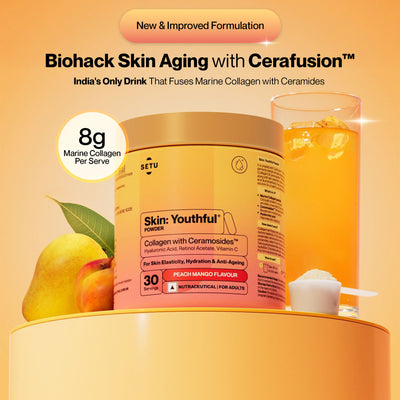Understanding Your Skin Health Requirements
02 Jul 2024
Skin health is vital to overall well-being, yet it often receives less attention than other health concerns. Our skin is not only the body's largest organ but also plays a crucial role in protecting us from external elements, regulating body temperature, and serving as a barrier against infections. Achieving and maintaining healthy skin involves understanding its requirements, which include proper care, nutrition, glutathione, collagen supplements, hydration, and protection from environmental factors.
The Basics of Skin Anatomy
Before delving into skin health requirements, it's essential to grasp the basic anatomy of the skin. The skin consists of three primary layers: the epidermis, dermis, and hypodermis (subcutaneous layer).
- Epidermis: The outermost layer of the skin, responsible for waterproofing and protecting the body from the environment.
- Dermis: Located beneath the epidermis, the dermis contains blood vessels, nerve endings, hair follicles, and glands (such as sweat glands and sebaceous glands).
- Hypodermis: The deepest layer, consisting mainly of fat and connective tissue that cushions the body and regulates temperature.
Each layer has specific functions that contribute to overall skin health, making it important to care for all layers adequately.
Factors Affecting Skin Health
Several factors influence the health and appearance of our skin:
- Genetics: Genetic predispositions can affect skin type (oily, dry, combination) and susceptibility to certain skin conditions.
- Environment: Exposure to sunlight (UV radiation), pollution, humidity levels, and temperature extremes can impact skin health.
- Lifestyle: Diet, hydration, sleep patterns, stress levels, and habits such as smoking or excessive alcohol consumption all affect skin health.
- Skincare Routine: The products and techniques used to cleanse, moisturize, and protect the skin play a significant role in its health.
Understanding these factors allows individuals to adopt practices that promote healthier skin and address specific concerns effectively.
Identifying Your Skin Type
Understanding your skin type is crucial for choosing the right skincare products and routines. The main skin types are:
- Normal: Generally balanced, with few imperfections and minimal sensitivity.
- Dry: Often feels tight or rough, and may be prone to flaking or cracking.
- Oily: Appears shiny, especially in the T-zone (forehead, nose, chin), and is more prone to acne.
- Combination: A mix of oily and dry areas on different parts of the face.
- Sensitive: Easily irritated by skincare products, weather conditions, or environmental factors.
Identifying your skin type helps in selecting appropriate cleansers, moisturizers, and treatments tailored to your specific needs.
Essential Components of Skin Health
To maintain optimal skin health, certain key components should be considered:
- Cleansing: Gentle cleansing removes dirt, oil, and impurities without stripping the skin of essential moisture. Choosing a cleanser suitable for your skin type is essential.
- Moisturizing: Hydration is crucial for all skin types. Moisturizers help maintain the skin's barrier function, preventing dryness and protecting against environmental damage.
- Sun Protection: UV radiation from sunlight can cause premature aging, skin damage, and increase the risk of skin cancer. Daily use of broad-spectrum sunscreen with SPF 30 or higher is recommended.
- Nutrition: A balanced diet rich in vitamins, minerals, antioxidants, and essential fatty acids supports skin health from the inside out. Foods like fruits, vegetables, whole grains, and lean proteins contribute to a healthy complexion.
- Supplementation: Adding glutathione and collagen supplements can contribute to skin health in distinct ways.
-
Glutathione: Known as the body's master antioxidant, glutathione helps neutralize free radicals that can damage skin cells and accelerate aging. It also supports immune function, which indirectly benefits skin health by reducing inflammation and promoting healing.
- Collagen: Collagen is a protein that provides structure to the skin, helping to maintain elasticity and firmness. As we age, collagen production naturally decreases, leading to sagging and wrinkles. Collagen supplements may help replenish lost collagen, improving skin elasticity and hydration.
Incorporating glutathione and collagen supplements like Setu's Skin: Combo into your skincare regimen, alongside a balanced diet and proper hydration, can enhance overall skin health.
- Hydration: Drinking an adequate amount of water helps keep skin cells hydrated and functioning optimally. Dehydration can lead to dryness, flakiness, and accelerated aging.
- Sleep and Stress Management: Quality sleep allows the skin to repair and regenerate. Managing stress levels reduces the production of cortisol, which can contribute to skin issues like acne and sensitivity.
Common Skin Concerns and Treatments
Understanding common skin concerns allows for targeted treatments and prevention strategies:
- Acne: Caused by excess oil production, bacteria, and clogged pores. Treatments may include topical treatments, oral medications, and lifestyle changes.
- Aging: Skin naturally ages over time, leading to wrinkles, fine lines, and loss of elasticity. Anti-aging skincare products containing retinoids, antioxidants, marine collagen and peptides can help minimize signs of aging.
- Hyperpigmentation: Dark spots or patches caused by sun exposure, hormonal changes, or inflammation. Treatments may include topical brightening agents, glutathione supplements, chemical peels, or laser therapy.
- Sensitive Skin: Easily irritated by products or environmental factors. Choosing fragrance-free, hypoallergenic products and avoiding harsh ingredients can help manage sensitivity.
- Dryness: Lack of moisture can lead to rough, flaky skin. Using rich moisturizers, and humidifiers, and avoiding hot showers can help retain moisture.
Consulting a Dermatologist
For persistent or severe skin concerns, consulting a dermatologist is advisable. Dermatologists are medical experts specializing in skin health and can provide personalized treatment plans tailored to your specific needs.
Conclusion
Achieving and maintaining healthy skin involves understanding its unique requirements and addressing factors that influence its health and appearance. By adopting a consistent skincare routine, protecting against environmental damage, and addressing individual skin concerns, you can promote lifelong skin health. Remember, what works for one person may not work for another, so it's essential to listen to your skin and adjust your routine accordingly. With proper care and attention, you can enjoy healthy, radiant skin at every stage of life.
Skin: Renew - Glutathione - Orange Flavour
- ₹1,994
- ₹1,994
-
₹2,600 - ( 23% OFF)
Categories
- Choosing a selection results in a full page refresh.
- Press the space key then arrow keys to make a selection.
this is the sidecart

















